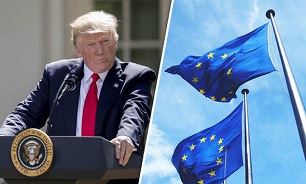US-EU ties Europe biggest challenge
 'Some of the battles at a global level have already begun:
the decision by Trump to withdraw from the Paris climate agreement, the attack
on WTO dispute resolution rules, and a soft erosion of the Iran nuclear deal,'
said an essay titled, 'Conceiving the Next European Union', published recently
by the European Council on Foreign Relations.
'Some of the battles at a global level have already begun:
the decision by Trump to withdraw from the Paris climate agreement, the attack
on WTO dispute resolution rules, and a soft erosion of the Iran nuclear deal,'
said an essay titled, 'Conceiving the Next European Union', published recently
by the European Council on Foreign Relations.
'What they all show is that the biggest challenge for Europe will be rethinking transatlantic relations and the nature of the international system,' the essay said.
It added that it is very difficult for Europe to change their mental image of the US from 'a constituent part of global order' to 'the biggest source of global disorder' based on the 'questions around the reliability of American security guarantees, the attack on global institutions, and the unpredictability of Trump.'
The article went on to say that, 'The EU should not give up on Atlanticism in the long term, but in the short term it needs to take some steps to deal with the POTUS in a different way.
The writer, Mark Leonard, then made some suggestions for Europe to boost its stance in dealing with the United States.
First, Europeans need to increase leverage, to deal with the US 'from a position of strength' as they have done before in issues like privacy, competition policy, and taxation.
Second, 'Europeans should hedge their bets and build alliances with others.' Trump is clearly trying to ignore the international institutions, hence, 'The EU must reach out to other powers to help shore up global institutions against Trumpian revisionism.'
Third, Europeans need to revolutionize their security cooperation; Europe cannot expect the US to defend it indefinitely. 'European law enforcement and intelligence agencies have relied until now mainly on their US counterparts for fruitful cooperation and intra-European intelligence coordination has been slower.'
What's more, 'successful terror attacks could drive voters towards nationalist parties across Europe.'
The essay doesn't overtly deal with the Joint Comprehensive Plan of Action (JCPOA), also known as the Iran nuclear deal, but it is more than clear that it is referring to US government's throwing a wrench in the works of the multinational deal.
The EU has decisively backed the deal and announced that the more the US tries to harm the deal, the more it gets isolated.
Addressing the opening session of the 2017 EU Ambassadors Conference in Brussels on last Monday, Federica Mogherini said Iran nuclear deal represented "the European way to foreign policy.”
"This was not an agreement between two countries, I have repeated it time and again and I have the impression that we will need to repeat it time and again in the months to come,” she added.
The German Chancellor Angela Merkel said on Saturday that the Iran deal is an example of successful diplomacy that can be used as a model.
ECFR, a pan-European institution founded in 2007, is an international think-tank that offers analyses about Europe’s role in the world. Now, it has offices in seven European capitals.
